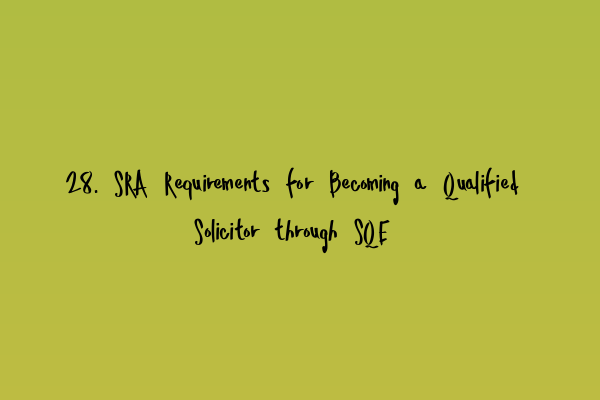28. SRA Requirements for Becoming a Qualified Solicitor through SQE
Are you considering a career in law and wondering how to become a qualified solicitor? The Solicitors Regulation Authority (SRA) has introduced a new qualification route called the Solicitors Qualifying Examination (SQE) to streamline and modernize the process. In this article, we will discuss the SRA requirements for becoming a qualified solicitor through the SQE, providing you with all the information you need to kickstart your legal career.
Understanding the SQE
The SQE is the new assessment method introduced by the SRA for individuals aspiring to become solicitors in England and Wales. It replaces the traditional qualification route, which consisted of the Legal Practice Course (LPC) and a two-year training contract. The SQE aims to ensure consistency and high standards across all aspiring solicitors by testing their practical legal skills and knowledge.
Under the new SQE framework, aspiring solicitors are required to pass two stages: SQE1 and SQE2. SQE1 tests the candidate’s functioning legal knowledge, while SQE2 assesses their practical legal skills. These assessments can be taken in any order and at different times. Candidates can take the SQE assessments as many times as needed to achieve a passing grade.
SRA Requirements for SQE
In order to become a qualified solicitor through the SQE, you must meet certain SRA requirements. Let’s explore these requirements in detail:
Educational Requirements:
Unlike the traditional route, the SQE does not require candidates to have a law degree or any specific academic qualifications. This means that individuals from a wide range of educational backgrounds can pursue a career in law through the SQE. However, having a strong foundation in legal studies can be beneficial in preparing for the assessments and understanding the complexities of the legal profession.
Click here to learn more about the SRA syllabus for the SQE.
Work Experience:
The SRA has replaced the traditional training contract with a new system called Qualifying Work Experience (QWE). Under the SQE, candidates are required to acquire at least two years of QWE, which can be gained before, during, or after completing the SQE assessments. QWE can be obtained in a variety of legal environments, including law firms, in-house legal departments, and other authorized legal organizations.
Read our review of SQE course providers to choose the best fit for your QWE.
Character and Suitability:
As with any legal profession, candidates must demonstrate high ethical standards and suitability for the role of a solicitor. The SRA will assess your character and suitability as part of the qualification process. This assessment takes into consideration factors such as criminal convictions, financial probity, and honesty. It is important to maintain a clean and transparent record to meet the SRA’s requirements.
SQE Assessment Fees:
There are certain fees associated with taking the SQE assessments. The costs vary depending on the number of assessments taken and the location. It is important to consider these fees when planning your journey to becoming a qualified solicitor through the SQE.
Preparing for the SQE
The SQE assessments are comprehensive and require thorough preparation. It is recommended to enroll in a reputable SQE course provider to ensure you are well-prepared for the assessments. These course providers offer tailored study materials, expert guidance, and practical training to enhance your chances of success.
Unlock your knowledge with SQE webinars for expert insights at your fingertips.
Tips for Success:
Studying for the SQE can be challenging, but with the right approach, you can excel in your assessments. Here are a few tips to help you succeed:
- Start preparing early and create a study schedule.
- Take advantage of available resources such as textbooks, online materials, and practice exams.
- Participate in SQE webinars and gain valuable insights from legal experts.
- Join study groups or form study partnerships to enhance your learning experience.
- Stay organized and review regularly to retain information effectively.
- Practice time management during the assessments to ensure you complete each task within the allocated timeframe.
Conquer the SQE with insider tips and study tricks for success.
Grading System
The SQE assessments are graded on a pass/fail basis. Candidates need to achieve the minimum passing score to pass each assessment. The assessments are designed to test your competence in applying legal knowledge and skills to real-world scenarios. Understanding the grading system will help you better prepare and align your study efforts.
Learn more about the grading system in the SQE and how exams are evaluated.
Conclusion
The SQE offers a modern and streamlined path to becoming a qualified solicitor in England and Wales. By understanding and meeting the SRA requirements, acquiring the necessary work experience, and preparing diligently for the assessments, you can achieve your goal of becoming a qualified solicitor. Take advantage of the available resources, webinars, and study materials to enhance your knowledge and skills. With dedication and hard work, you can pave the way for a successful legal career.
